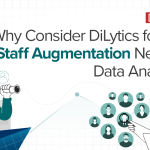
What is Analytics Strategy and Roadmap?
Analytics Strategy is an organization’s intent that specifies the business and technology aspects that it should put in place to ensure that the right insights reach the right people at the right time to make the right decisions.
Analytics Roadmap is the translation of analytics strategy’s intent into a plan of action that identifies the various initiatives that a company needs to undertake, evaluates the potential of each initiative, and outlines how and when they should be undertaken.
For more insights into our ‘analytics strategy and roadmap’ methodology, please read our blog ‘Analytics Strategy and Roadmap – Compass and Clock for Analytics Leadership’.
Why is Analytics Strategy and Roadmap Important?
As companies evolve, their information assets grow steadily, whether from acquisitions or from organic expansion. However, if these data assets are not managed strategically, they would hinder the company’s ability to leverage insights from data effectively and make informed decisions.
For companies, some of the risks of not embarking upon analytics strategy and roadmap exercise include:
Missed Business Opportunities
Without analytics strategy, companies may miss opportunities for growth, cost optimization, and competitive advantage that could have been identified through data insights.
Inefficient Resource Allocation
Lack of a roadmap may lead to companies investing in data initiatives that do not align with business objectives or fail to prioritize high-impact initiatives.
Poor Decision-Making
Absence of analytics strategy means decisions may be made on intuition or incomplete information, leading to suboptimal outcomes and missed potential for data-driven insights.
Inconsistent Data Quality
Without a well-defined strategy, data may not undergo proper cleansing, transformation, or governance, resulting in inconsistent data quality and unreliable analyses.
Data Silos and Inaccessibility
Companies may struggle with data silos, where data is scattered across various systems and departments, making it difficult to access and analyze in a unified manner.
Inaccurate or Incomplete Insights
The lack of a roadmap may lead to incomplete or inaccurate data analyses, compromising the reliability of insights and hindering informed decision-making.
Competitive Disadvantage
In a data-driven business environment, companies without a clear analytics strategy risk falling behind competitors who leverage data effectively to gain a competitive advantage.
Lack of Data-Driven Culture
The absence of an analytics strategy may prevent the development of a data-driven culture within the organization, where data is not valued as a strategic asset.
Inability to Adapt to Technological Advancements
Companies without an analytics strategy may struggle to keep up with rapidly evolving data technologies and may not be able to take advantage of the latest innovations in data analytics.
Comparison Sheet
Analytics Strategy & Roadmap for an Analytics Program’s Success: Comparative Study
How to Go About Conducting
Analytics Strategy and Roadmap Exercise?
DiLytics conducts ‘Analytics Strategy and Roadmap’ exercise with a structured methodology as depicted in the schematic aside:
More often than not, DiLytics conducts this exercise by focusing on the most necessary elements only. This enables us to perform this exercise economically, in quick time, and in a manner that justifies the cost-benefit equation for our customers.

What are the Components of Analytics Strategy and Roadmap?
Embedded within DiLytics’ approach to conducting analytics strategy and roadmap exercises for clients, lies
our commitment to provide comprehensive consultation that encompasses a spectrum of critical areas:
Analytics Strategy
Data Warehouse: subject areas, logical data model, fact and dimension tables, etc
Data Integration: integration process flow, data load process, error handling/logging, automation, etc
Data Analytics: self service, ad hoc, real time, predictive, operational reporting
Others: data catalog, data security, data quality & standardization, data governance


Analytics Roadmap
Identify analytics initiatives/use cases
Sequence analytics initiatives/use cases across different phases
Identify scope, timelines, resource requirements and training needs for each phase
Define communication and change management plan for each phase
Want to Know More?
DiLytics has been in the business of providing data analytics services for close to 12 years. During this period, we have maintained a laser-like focus on everything that has to do with analytics and have developed time-tested methodologies for almost every customer need in the analytics domain.
To know more about our services, solutions and methodologies, please get in touch with us
by providing your contact information:
DiLytics Delivers
Manufacturing Analytics
DiLytics implemented a Manufacturing Analytics solution for a Biotechnology Company in a short period of 100 days.
Custom Data Warehouse
DiLytics implemented a custom data warehouse solution for a Leading Container Leasing Company in a short span of 150 days.
Center of Excellence
DiLytics established a Business Intelligence Center of Excellence to help a Video Game and Digital Entertainment Company maximize RoI.



